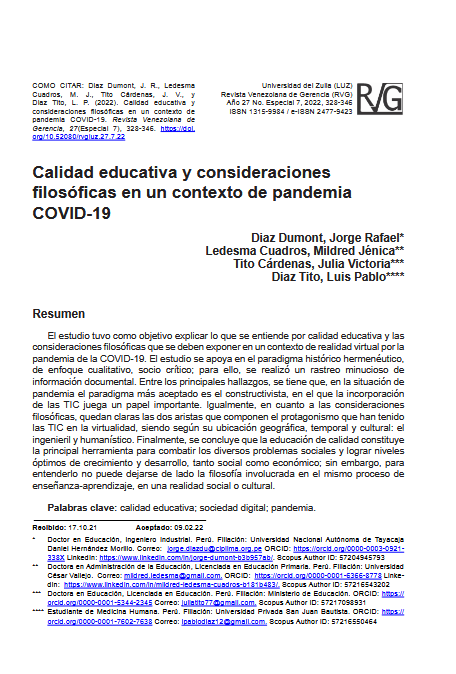Calidad educativa y consideraciones filosóficas en un contexto de pandemia COVID-19

Date
2022Author
Diaz Dumont, Jorge Rafael
Ledesma Cuadros, Mildred Jénica
Tito Cárdenas, Julia Victoria
Diaz Tito, Luis Pablo
Metadata
Show full item recordAbstract
El estudio tuvo como objetivo explicar lo que se entiende por calidad educativa y las consideraciones filosóficas que se deben exponer en un contexto de realidad virtual por la pandemia de la COVID-19. El estudio se apoya en el paradigma histórico hermenéutico, de enfoque cualitativo, socio crítico; para ello, se realizó un rastreo minucioso de información documental. Entre los principales hallazgos, se tiene que, en la situación de pandemia el paradigma más aceptado es el constructivista, en el que la incorporación de las TIC juega un papel importante. Igualmente, en cuanto a las consideraciones filosóficas, quedan claras las dos aristas que componen el protagonismo que han tenido las TIC en la virtualidad, siendo según su ubicación geográfica, temporal y cultural: el ingenieril y humanístico. Finalmente, se concluye que la educación de calidad constituye la principal herramienta para combatir los diversos problemas sociales y lograr niveles óptimos de crecimiento y desarrollo, tanto social como económico; sin embargo, para entenderlo no puede dejarse de lado la filosofía involucrada en el mismo proceso de enseñanza-aprendizaje, en una realidad social o cultural. Abstract: The purpose of the study was to explain what is understood by educational quality and the philosophical considerations that should be exposed in a virtual reality context due to the COVID-19 pandemic. The study is based on the historical hermeneutic paradigm, with a qualitative, socio-critical approach; for this purpose, a thorough documentary information search was carried out. Among the main findings, the most accepted paradigm in the pandemic situation is the constructivist paradigm, in which the incorporation of ICT plays an important role. Likewise, in terms of philosophical considerations, the two aspects that make up the leading role that ICTs have played in virtuality are clear, according to their geographical, temporal and cultural location: engineering and humanistic. Finally, it is concluded that quality education is the main tool to combat the various social problems and achieve optimal levels of growth and development, both social and economic; however, to understand this, the philosophy involved in the same teaching-learning process, in a social or cultural reality, cannot be left aside.

